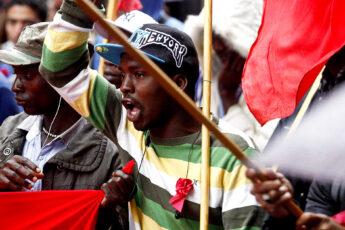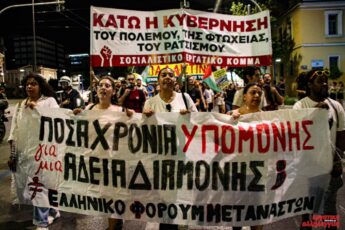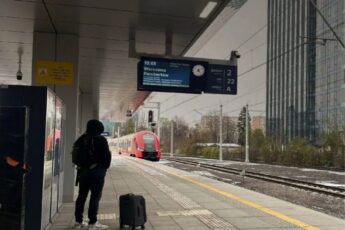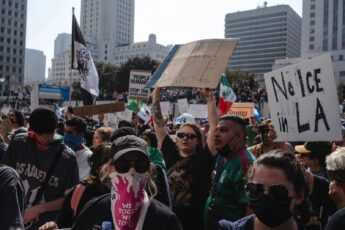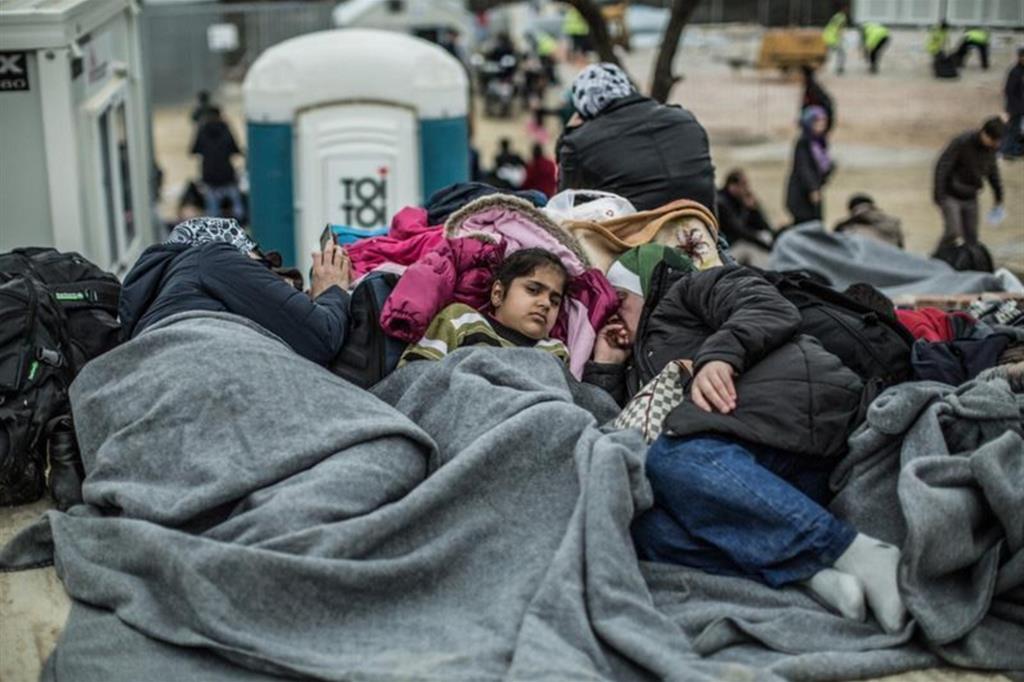
by Yağmur Yurtsever (Turkey)
We publish an article by Yağmur Yurtsever, activist based in Turkey, on the Turkish government’s violence against migrants and refugees that erupted at the end of June. The escalation of this violence, which in Turkey as elsewhere is nothing new, must be seen in the context of the war scenario and the advance of the right-wing. The European agreements with Turkey, as well as with other countries, show how today the war against migrants is becoming a strategic weapon in a climate of militarisation of society that crosses states and is functional to hinder processes of organisation and insubordination. Yağmur’s account shows how racist violence is a consequence of Turkish and European policies in recent years as well as a symptom of the new rise and legitimisation of authoritarianism on a global level. Against this intensification of oppression and against the normalisation of war and violence that it brings, the article calls for a transnational response, which in the face of the fragmentation and repression of movements and struggles is now more necessary than ever.
In the past week, Turkey has witnessed a disturbing surge in violence against migrants and refugees. These pogroms and attacks have raised significant concern among the oppressed of the world. This article aims to make a transnational solidarity call along with giving a snapshot of the rising racist attacks and the pogroms in Turkey, that have the potential to be an example for the fascists of the world. Under all the political discussions of the elections in the European Union and so so-called “worldwide shift to the right”, reminding once more that “the right” is already here, the occupation of Ukraine and the genocide in Gaza are now and this should speak to all of us.
Turkey has long been a major hub for migrants and refugees, largely due to its location bridging Europe and Asia, which the imperialist bargains have used for more than the last decade. The country hosts one of the largest refugee populations in the world, with millions of Syrians and other nationals seeking refuge from conflict still deepening in the Middle East with genocides, wars and annexation.
Over the past week, several racist and xenophobic attacks targeting migrant and refugee neighbourhoods and communities have been raging across Turkey. On the night of June 30th, in Kayseri, following news of the alleged abuse of a 6-year-old child by a Syrian suspect, a wave of violence erupted in the Danişmentgazi neighbourhood. Throughout the night, homes were set on fire, vehicles were overturned and destroyed, and shops were vandalised. The refugee community in the city experienced immense fear and trauma as a result of these attacks.
The violence did not stop there. On July 1st, similar attacks continued in multiple cities including Nizip, Antep, Hatay, Adana, Konya, and Kayseri. In these locations, racist and nationalist groups attacked homes, businesses, and vehicles belonging to refugees. These attacks were often accompanied by chants of “Ne mutlu Türküm diyene” (“How happy is the one who says I am a Turk”), highlighting the xenophobic and nationalistic motivations behind the violence.
These attacks, turning immediately into pogroms have unfortunately included the murder of a worker child. In Antalya’s Serik district, on July 3rd, a 17-year-old Syrian refugee worker named Ahmet Handan El Naif was killed in an alleyway. This incident underscores the deadly consequences of the rising racist sentiment in Turkey.
The physical and psychological toll on the victims of these attacks is profound. Many have suffered injuries, while others are grappling with the trauma of being targeted in what should be a place of refuge. The attacks have also led to further displacement, with already vulnerable populations now facing even more precarious living conditions. The refugee communities, already struggling with limited resources, are now dealing with heightened fear and uncertainty. The history of the pogroms and genocides makes it impossible for the social and political movements to institute physical and practical solidarity against the pogroms and attacks regarding, the fascist pogroms cause immense threats to not only the migrants and refugees but the democratic public.
The Turkish government had no intervention whatsoever in the pogroms and took no responsibility. The irresponsibility of the state to avoid the widening of the attacks and pogrom led to the murder of an underage worker. Local authorities, including the Governor of Kayseri, attempted to downplay the attacks by emphasising that the abused child was not Turkish, a response that supports the racist intentions of the attacks.
The imperialist politics on the lives, rights and labour of the migrants and refugees is one of the major reasons for the attacks. The disgraceful bargains of the European Union and the Turkish state which have been continuous for the last decade have an irrefutable responsibility on the pogroms. It is to the revolutionaries, socialists, feminists, and transnationalism to stop these attacks with an effective solidarity, that would also obstruct the real possibility of these attacks to jump to Europe and beyond like wildfire.
The Turkish government’s 13-year-long pragmatic migration policy has also been collaborated with the EU. The exploitation of cheap, unprotected migrant labour by capitalists, has further exacerbated the conditions of the working class while the attacks against the gained labour rights have been tried to be overshadowed by the racist and nationalist attacks. These rigged imperialist policies on the lives of the migrants and refugees have been contributing to both capitalist exploitation and the rise of the right all over the world as a way out and compensation for the deepening world war. While the exploitation itself is the resort of the capitalist crisis, Erdoğan’s straightening position to mediate both the Ukraine occupation and genocide in Gaza and now to cooperate with Esad without giving up the annexation turns out to be a risk to take over the lives of millions of migrants and refugees. As the labourers and the oppressed of the world, we emphasise our solidarity and refuse to take the fall for the reproduction of imperialism and fascism. In such conditions, our transnational solidarity and TSS are the evident locus to fight back against today’s pogroms and those attacks to come.
For social movements dedicated to labour, gender equality, peace, and migrant rights, these events underscore the urgent need for solidarity and action. Our immediate solidarity and struggle with the perspective of the transnational struggle would also have an impact on avoiding the spreading of pogroms against migrants and refugees all over the world.


